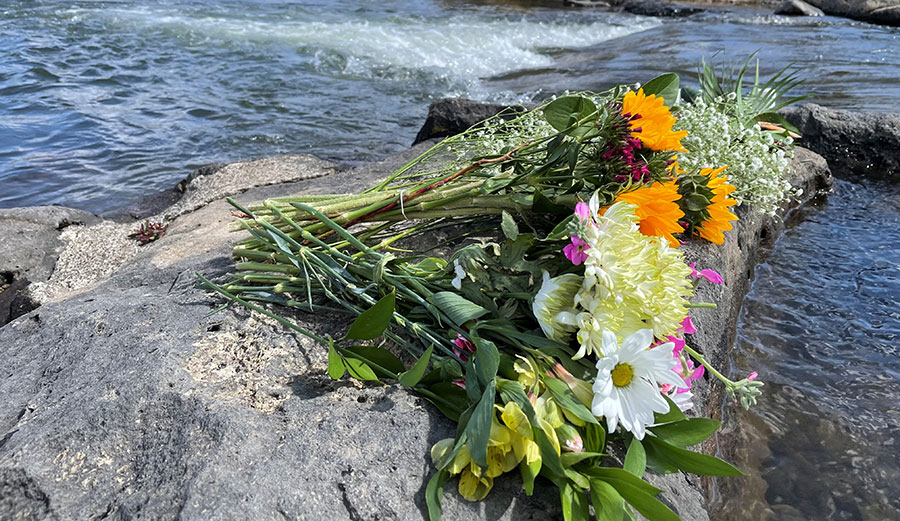On April 30th, 2022 17-year-old Ben Murphy, a local river surfer became stuck on the wave at Bend, OR. He was able to surface once but died despite heroic efforts of fellow surfers jumping in and grabbing his body. Investigations determined his death was due to a foot entrapment between the pneumatic gate/flap that shapes the wave and one of the static kickers. His leash was also suspected to be a contributing factor by pulling him into and/or holding him in the entrapment.
Reality is, a river surfer drowned that day; but as a result, the Bend government officials and local river surfing community came together to learn from the accident, make repairs to the wave, set a hard fast rule that leashes of any kind are forbidden from use at the Bend Wave, and the wave was re-opened within months of the accident.

Three lessons are to be learned from the river surfing fatality at Bend: leashes are a risk often need not be taken; wave flaw/repairs needed; and, transparency in dealing with the accident and resolution to it. Transparency can be argued as the most important lesson learned.
First, surfboard leashes in the river are dangerous no matter if they do have “quick releases”. It is suspected the Bend surfer had a quick release calf leash. A few seasons back, a Colorado river surfer in Durango almost drown being unable to locate his quick release leash on his pfd while being held down under water (board dislodged from rocks just as the surfer began to breathe in water). And in June 2019, Michael Robert James, river surfing in Buena Vista at the Staircase Wave, “flush down” while fully kitted out with a helmet, pfd, and quick release leash attached to a high volume board (little is known but his leash could have contributed to his death with overconfidence, or even being unable to swim free of his board and thus was dragged through the rapids below).
As part of reopening the Bend wave after the fatality, leashes are no longer permitted on that wave. Locals about lost their minds when the leash ban was proposed; but people quickly figured out how to surf Bend without leashes.
Albeit in Colorado our laws allow you to make your risk tolerance determination, so if you want to go hike a fourteener unprepared and possibly kill yourself, go right ahead. Same could be said about river surfing with a leash in Colorado, you set your risk tolerance on a surf leash because (except for Golden and pfds) nobody is going to tell you what or what not to wear in the river. This leaves it up to the river surfing gear manufacturing industry to figure out a better leash system, same could be said about pfds used for river surfing.
Secondly, all river waves have some sort of inherent danger. The Bend park and recreational staff and leadership did a thorough investigation into the causes of the fatal accident. They identified a design flaw of a gap between the static kicker and the pneumatic gate/flap. Repairs were made to the wave and the gaps no longer exist on the wave.
Periodic review of waves built in Colorado need to be done to make any determinations of dangers that can be corrected or properly mitigated. And if anyone is seeing a problem with wave, they should make it known. At the Bend wave, people had claimed they had experienced the same foot entrapment that ultimately resulted in a later death, but it is not clear if those persons ever reported the problem to anyone of authority.
Thirdly, the most impressive and best lesson learned from the Bend fatality was the open governance and transparency by the park and recreation department in every step of the way from investigation, to repairs, to policy changes, to reopening. Public reports were made and open meetings were had that resulted in reopening Bend as a safer wave to surf. Sure there were some hurt people involved in the process but ultimately all voices were able to comment and speak up in the process.
Transparency is something seriously missing in river surfing in Colorado from the government officials, to the whitewater park builders, to the river surfing industry, and to the heuristic traps of the river surfing communities. Openness concerning river surfing is taboo for reasons as far ranging from profits, to being in control, to selfishness of localism, or other reasons such as tribalism (ocean legacy v. SUP legacy, mountain v. front range, etc).
Conclusion:
Colorado’s river surfing year after year has seen various close calls from footholds to leash incidents, to an unfortunate death; however, all these have been swept under the rug. Nothing has been learned from these accidents. Chalk it it up to fear of addressing the situations, worried about local surfing communities/businesses being held responsible, or ironically, worried about “being sued” for damages when discussing the matters of river surfing safety/accidents. None of those reasons are valid reasons not to engage in open and honest discussions about river surfing accidents, fatalities, and design flaws (flaws from waves to river surfing gear).
Time to put the differences aside…. The hope is we, as Colorado river surfers, can learn from the Bend wave fatality by being smart enough to acknowledge and discuss accidents; willingness to ask hard questions; and willingness to be brave enough to say something when warranted, and willingness to demand transparency by those who have the ability to address/correct the situation.
The comment section is open for this important topic. Be respectful in your responses in order to be published.
References (click on links):
“Bend makes changes to surf wave after teen’s death” 6/8/2022
Leash Free Skills Overview (Bend Park and Rec) video.
Michael Robert James 6/30/2019 death American Whitewater Accident Database Report
Heuristic Decision Making (backcountry skiing)
“Your Life On A Leash: Ankle Leashes Will Kill River Surfers” Riverbreak Surf Mag June 25th, 2013